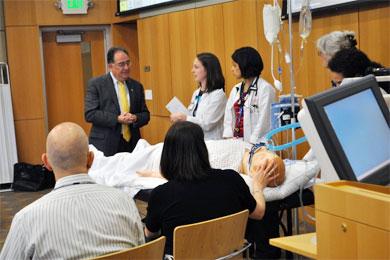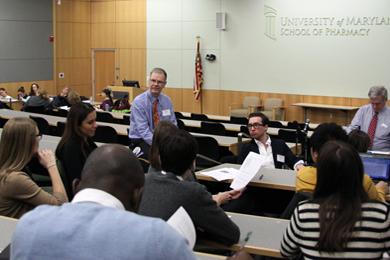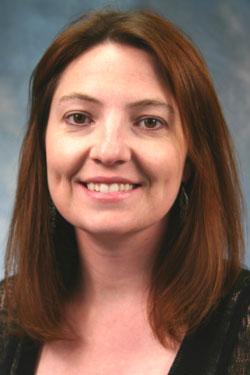SOP “Leads by Example” at First-Ever UM Interprofessional Education Day
Faculty and students participate in day-long event designed to encourage collaboration among health care professionals from all disciplines.

By Malissa Carroll
April 22, 2013
On April 10, more than 300 students and 100 faculty members from all six schools at the University of Maryland, Baltimore came together for the campus’ inaugural Interprofessional Education (IPE) Day . Coordinated by the President’s IPE Task Force, this day featured nine IPE scenarios and other events to showcase existing IPE activities and raise awareness of the local, national, and international interest in IPE.
“IPE Day was created to highlight the benefits of interprofessional education and help practitioners better appreciate the expertise of individuals from all disciplines,” says Richard Dalby, PhD, FAAPS, associate dean for academic affairs at the University of Maryland School of Pharmacy, professor of pharmaceutical sciences, and member of the President’s IPE Task Force. “Individuals who participated in the day’s events also had an opportunity to advocate on behalf of their profession’s role as part of the multidisciplinary health care team.”
One hundred twenty-six students represented the School of Pharmacy at IPE Day, with faculty members participating in eight out of the nine featured scenarios. Mary Lynn McPherson, PharmD, BCPS, CPE, professor and vice chair of education for the Department of Pharmacy Practice and Science (PPS), and Heather Congdon, PharmD, CACP, CDE, assistant professor in PPS and assistant dean for the School of Pharmacy at the Universities at Shady Grove, led two of the scenarios in which faculty and students from across campus were invited to participate. Each scenario mimicked a real world situation that health care professionals might encounter during their practice and provided an opportunity for students to practice the four core competencies of interprofessional collaborative practice: values/ethics for interprofessional practice, roles/responsibilities, interprofessional communication, and teams and teamwork.
McPherson’s session, titled “Growing Pains – Can A Team-Based Approach Revolutionize Pain Management?”, asked students to work in interdisciplinary teams to evaluate a patient dealing with pain. It highlighted the roles played by each discipline and emphasized how the team approach can optimize patients’ treatment outcomes.
Titled “Do Critically Ill Patients Benefit from A Team of Critical Care Thinkers Managing Their Case?”, Congdon’s session asked students to work together in a high-fidelity simulation to assess and prioritize the needs of a critically ill patient. This session also involved Jay A. Perman, MD, president of the University of Maryland, Baltimore.
Other faculty members from the School of Pharmacy who participated in IPE scenarios included Chanel Agness, PharmD, BCPS, CGP, assistant professor in PPS; Nicole Brandt, PharmD, CGP, FASCP, associate professor in PPS; Christine Choy, PharmD, assistant professor in PPS; Sandeep Devabhakthuni, PharmD, BCPS, assistant professor in PPS; Suzanne Doyon, MD, ACMT, medical director of the Maryland Poison Center, Nicholas Fusco, PharmD, assistant professor in PPS; Jeff Gonzales, PharmD, BCPS, assistant professor in PPS; Wendy Klein-Schwartz, PharmD, MPH, associate professor in PPS and coordinator of research and education at the Maryland Poison Center; Jill Morgan, PharmD, BCPS, associate professor in PPS and the School’s associate dean for student affairs; Neha Pandit, PharmD, assistant professor in PPS; Kathleen Pincus, PharmD, BCPS, assistant professor in PPS; Kathryn Walker, PharmD, BCPS, assistant professor in PPS; and Linda Simoni-Wastila, BSPharm, PhD, professor and vice chair of research for the Department of Pharmaceutical Health Services Research.
After all scenarios concluded, the more than 300 students gathered to reflect on their experiences at a debriefing in the School of Nursing auditorium, where pharmacy students received the highest accolades. “Pharmacy students know everything,” a professional student from another school observed to widespread applause.
Deans, or their representatives, from each school at the University of Maryland, Baltimore later participated in a panel discussion held at the School of Pharmacy. Most individuals present during this discussion strongly affirmed their commitment to IPE and highlighted existing IPE initiatives in their respective schools. Faculty members who assisted with managing the morning sessions also shared their experiences, with many calling for more IPE activities on campus and a schedule that would facilitate further student involvement.
This day-long event coincided with establishment of the Center for Interprofessional Education at the University of Maryland, Baltimore. Directed by Jane M. Kirschling, PhD, RN, FAAN, dean and professor of the School of Nursing, this Center is intended to help students learn and work together across disciplines, fulfilling a key aspect of the University’s strategic plan.


